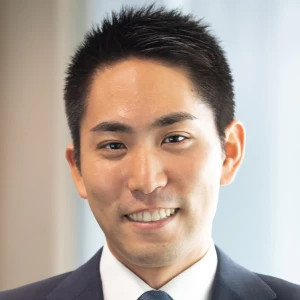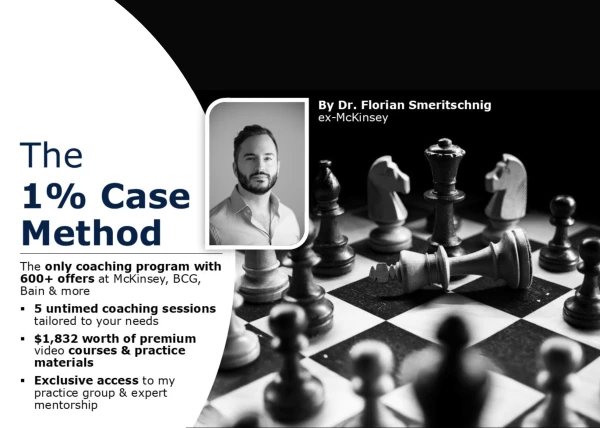Hi,
I have my first round of McKinsey next week. I would like to understand how much time I can spend on explaining the structure. Is it, given the time constraints, enough to talk about the first two layer of buckets, or is an explanation of each factor in the second layer needed? I usually explain the factors, as also indicated in the McK case prep materials. Yet, I got the feedback that it is quite long (like 6 minutes). What is your take on it?
McKinsey Case Interview - How much time for laying out structure


Hey there,
Thanks for this question which is crucial and popping up ever so often on PrepLounge.
There is a big misunderstanding and difference between a framework derived for McKinsey vs. a framework created for other consulting interviews.
At the core, McKinsey wants to see creative ideas communicated in a structured manner, the more exhaustive the better.
Your goal should be to come up with a tailored and creative answer that fits the question. The framework should - broadly speaking - follow these three characteristics:
- Broad
- Deep
- Insightful
You would need to go into detail and qualify your answer with practical examples and more details. The more concrete the better.
To come up with the framework you have 1-2 minutes (2 minutes is kind of a soft limit). Then, feel free to take up to 6-8 minutes to present your structure, your qualification, and hypotheses. This is due to the interviewer-led format that McK employs. The interviewer might even ask 'what else' if you
- haven't gone broad (covered all essential areas) or deep enough (provided concrete examples)
- did not explain your ideas well enough for them to stand out (again, you have time here)
The firm wants to see exhaustive and creative approaches to specific problems, which more often than not do not fit into the classic case interview frameworks that were en vogue 10 years ago...
Again, this only applies if everything you say
- adds value to the problem analysis
- is MECE
- is well qualified
- includes a detailed discussion of your hypotheses at the end
Summing up the core differences:
- You have more time to think about it
- You have more time to lead the interviewer through your structure
- You need to go wide and deep to create an exhaustive and creative structure, whereas in BCG/Bain you rather need to be focused and quickly zero in on the key points where the problem of the case is most likely buried
- Questions tend to be more creative and not suitable for classic frameworks, especially on the lower levels of the framework
- You do not need to drill through your framework in a McKinsey case. You can provide an indication of where you would move your analysis, however, the interviewer will direct the case going forward
The difference in format, evaluation criteria, and way of answering a question is the reason why I recommend preparing very differently for McK interviews vs. other consultancies.
If you are interested to learn more, I have written a detailed insider perspective on the McKinsey case interview here: https://www.preplounge.com/en/mckinsey-interview
Let me know if you have more questions!
Cheers,
Florian

Hi there,
In short, go for deep, rather than shallow. There's no perfect performance, so if they have something to pick on, let it be the fact that you spoke for too long or you provided too much detail, rather that you provided to little and your structure was superficial.
There is no set time and the ideal length really depends on the question being asked, but as a general guideline, I'd follow this:
- Ensure the structure is MECE - comprehensive is the most important part
- Aim for 3-5 categories on level one, then have sub-areas in each of them to then discuss in more detail
- Aim to be precise in your communication - providing clear examples goes a long way
- Develop the structure bottom-up rather than applying the common frameworks - this require some practice but once you get it you can ‘unlock’ any case
- Try to think outside of the obvious solution space - e.g., if the client has a problem and a hypothesis of how to solve it, try to think whether there are additional ideas beyond that hypothesis that you framework could assess
Best,
Cristian

Congratulations to be invited :)! I wouldn't really worry about timing in a McK interview as the interviewer will guide/interrupt you anyway. Florian is right in highlighting that McK is looking for breadth (are you covering all categories) and depth (are you able to drill down in detail). If you really want to excel on the case structuring be sure to think about how various drivers are linked with one another. In the end it's about having trained a McK case interview couple of times to get the right feeling. Happy to help.
Best
Freddy

Hi there,
First of call, congrats to your interview invitation! Agree with the other coaches - 6 minutes is a bit on the long side. Just to explain the structure, 2-3 min should usually be enough.
That said, always make sure, you communicate your structure in an effective, easy-to follow top-down manner.
1. Recap what you're solving for (your top box of the tree)
2. Outline the 2nd layer - show the breadth of the structure
3. Double-click - explain the different branches (but only as a summary)
4. ALIGN the proposed structure with the interviewer - get her/his sign off. This is a very under-estimated point that most candidates are not aware of. Make sure you give the interviewer platform to input and guide you, it can really get you out of trouble, if your initial draft is not quite there yt.
Hope this is helpful.
Feel free to reach out via PM you'd like to learn more on how to effectively structure, communicate and align your structures. Will be happy to help - and surely other coaches would be too.
Cheers, Andi

Hi there,
Q: Is it, given the time constraints, enough to talk about the first two layer of buckets, or is an explanation of each factor in the second layer needed?
I would recommend you explain each of the factors, so also present the details. That’s because at McKinsey the interview is usually interviewer-led, meaning you may not have a chance to drill down later on the details.
A total of 6 minutes seems on the long side indeed and possibly shows you could communicate more effectively. On the other hand, it is difficult to judge without seeing your live performance. The type of question and how fast you speak could impact that as well.
Hope this helps,
Francesco

There's no set time but what's important to remember is that you want to engage the interview and “solve the case together". An initial 3-5 mins sharing your initial thinking feels about right. Building on what others have said around breadth and depth, the additional dimension to think about is your ability to prioritise within that with a meaningful hypothesis or two. Taking a simple example, most candidates can breakdown a profitability problem into its component pieces, but very few will actually identify 1-2 sub-branches that really matter (i.e., 80:20).

Hello!
I wouldn´t dedicate too much time thinking about this, since it´s not critical - and it can move your attention from contents points that indeed are critical.
The interviewer has a proactive role here, so they would cut you if you talk too much. This said, 6 minutes for an average case seems a bit too long.
Hope it helps!
Cheers,
Clara

Hi there,
In my view 6 minutes is indeed a bit on the long side. It indicates a lack of precision in communication.
That said, I completely agree with Florian in that you need breadth AND depth to your framework.
You need substructure and you need to work through the framework methodically.
Work on communicating in a more precise/concise manner while not cutting actual content
One example of this is saying “for example” and rattling off a few of the ideas instead of saying (the first major cost is x and what I mean by that is y. The second major cost is a, and what I mean by that is b).
^This is one technique/example of saying the same thing with fewer words, but I'll save the rest for actual coaching :)














